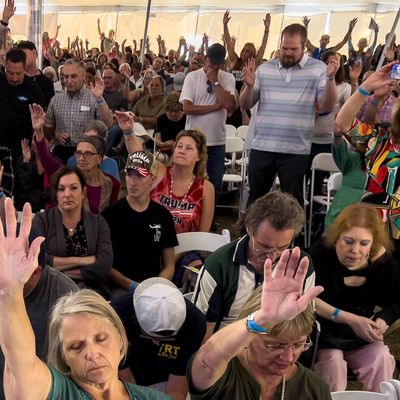
Everyone covering Republican presidential politics knows how important a force conservative Evangelical Christians are in that party, particularly in such crucial precincts as the first-in-the-nation Iowa caucuses. So it has become routine to examine GOP politicians for their adherence to various issue positions of presumed significance to these voters, and to their pulpit-based leaders, who collectively used to be known as the Christian right.
That’s still well worth doing at a time when the culture-war issues so closely associated with religious conservatives are red-hot topics in American politics, and of great importance to many of the most likely voters in the Republican presidential primaries. Clearly, Ron DeSantis, Mike Pence, and Tim Scott are particularly focused on letting conservative Evangelicals know how committed they are to the battle against legalized abortion, LGBTQ rights, “woke” corporations, and government impingements on “religious liberty.” These candidates are intensely determined to prove they are more faithful to the agenda of the Christian right than their front-running rival Donald Trump.
But there are two major problems with any sort of by-the-numbers effort to flip conservative Evangelicals against Trump. First, these voters have an abiding sense of gratitude for what Trump has already done for them. Second, Trump himself is deeply tied to the religious views of a growing subset of Christian Evangelicals.
As the 45th president frequently reminds conservative Christian audiences, he was the first Republican president to redeem decades of promises to secure the reversal of Roe v. Wade and the abolition of federal constitutional abortion rights. And more generally, Trump discarded decades of embarrassed Republican efforts to downplay cultural issues in pursuit of upscale swing voters favoring moderation and compromise on topics that Evangelicals considered matters of eternal and immutable principle. He was firmly the enemy of the enemies of the people in the pews, and smote them hip and thigh unscrupulously. It will take more than a slightly higher rating on the latest set of litmus tests laid out by conservative religious leaders for mere politicians to match the founder of the MAGA movement in the esteem of voters who really do want to turn back the clock to a “greater” America.
The second element of Trump’s Evangelical primary firewall is the significant and rapidly growing subset of American Evangelicals whose view of politics and its relationship to religion cannot be captured by mere policy issues. Trump plays a larger-than-life role in a supernatural drama of good and evil that many of these believers embrace via the teachings of a new set of “prophetic” teachers and preachers, as religious scholar Matthew Taylor explains:
Trump’s most ardent Christian advocates are nondenominational Charismatic evangelicals, a group sometimes referred to by academics as Independent Charismatics or Independent Network Charismatic Christians.
Independent Charismatics emphasize a modern, supernaturally driven worldview where contemporary prophets speak directly for God; miracles are everyday experiences; menacing demonic forces must be pushed back through prayer; and immersive, ecstatic worship experiences bolster Christian believers’ confidence that they are at the center of God’s work in the world. These believers are country cousins to the more denominationally aligned Pentecostal evangelicals, though the lack of denominational oversight and the freewheeling nature of the independent Charismatic sector leaves them more vulnerable to radicalization.
Many Independent Charismatics have been radicalized by the passions unleashed by Trump and the conflicts he has engendered. Cultural warfare is for them spiritual warfare in which Trump is literally an agent of the divine will. Independent Charismatics are notably active in Trump-adjacent groups like the ReAwaken America Tour, in which pardoned former Trump lieutenants Roger Stone and Michael Flynn have been conspicuous participants, and a newer group called Pastors for Trump. The 45th president is an irreplaceable and heroic figure in the apocalyptic cosmologies of such groups, who aren’t about to replace him with some other Republican politician, no matter what more orthodox Evangelicals say or think. Specific political “issues” are very small in their reckoning of God’s destiny for America.
So within the legions of conservative Evangelicals engaged in American politics, Trump has charismatic shock troops whom he can count on to stick with him as though their lives — indeed, their souls — depend on it. If you add in the Evangelicals who uniquely trust Trump for keeping his promises to them and are grateful for his reshaping of the U.S. Supreme Court to make it a powerful allied force, you can see why he’s not as vulnerable to raids on this base of support as you might imagine from the boasts of his rivals that they are nearer to God than he is.
More on politics
- Trump Is Threatening to Invade Panama, Take Back Canal
- What Happened to Texas Congresswoman Kay Granger?
- Who Is Lara Trump and What’s With the Quashed Senate Rumors?






























